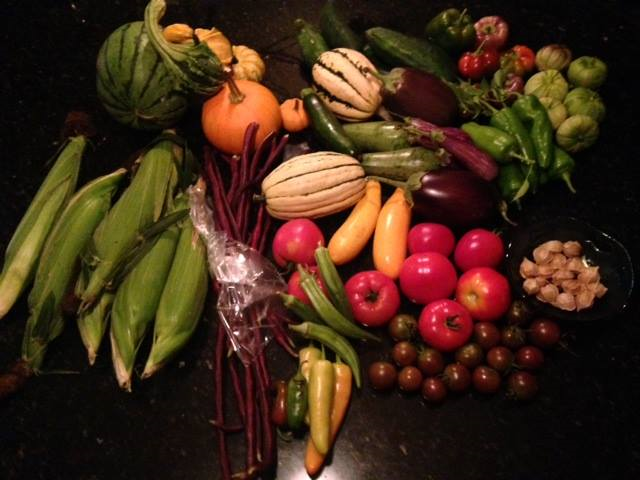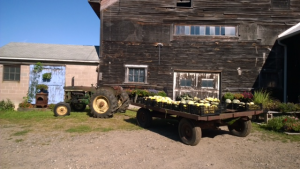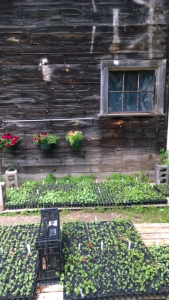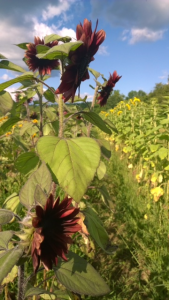WESTFIELD – In the coming weeks, Connie and John Adams of Yellow Stonehouse Farm on Root Road look forward to spending time in their greenhouses – organically planting seeds to get a jump start on the spring planting season.
“Planting seeds indoors gives them a head start and then we plant the seedlings in the field,” said John Adams. “Planting plants helps ensure we have a more diverse crop since we don’t have to wait for the seeds to germinate.”
The couple’s hilltop 55-acre property, close to the Southampton line, has the distinction of the Manhan River dividing the farmland, creating an ideal environment for growing vegetables and flowers, while living harmoniously with wildlife. The couple noted it is not unusual during the planting and harvesting seasons to see bobcats, bears, coyotes, and bald eagles up close.
“We also see so many beautiful birds,” said Connie Adams.
The couple is also proud to point out their new USDA certified organic farm certification.
“The certification is the only system of food labeling that is subjected to independent review, assuring consumers that toxic, synthetic pesticides used in conventional agriculture are replaced by management practices focused on soil biology, crop diversity, and plant health,” said John Adams.
“After our commitment in 2012 to use organic practices, it took three years to get certified organic,” said Connie Adams. “We went through a rigorous process that included inspectors looking at the farm and all of our processes.”
The couple noted that as their membership pledges have increased over the years, they soon realized that area residents sought “cleaner and tastier foods.” Membership applications are now available for the spring/summer harvest season on the farm’s website, www.yellowstonehousefarmcsa.com, or by calling (413) 562-2164.
“We have had community members coming from as far away as Connecticut,” said John Adams. “We hope to have 200 membership pledges for the spring/summer season.”
Local community members share in the harvest by paying a membership fee up front to cover annual expenses. In return, members collect a share each week of fresh picked, hand-washed produce and additional pick-your-own crops as available at an open style market. Pick-up days available are Wednesday, Thursday, Friday and Saturday. The full farm shares are “generously sized” to feed four persons.
“Shareholders are partners with the farmer in growing food for the community,” said Connie Adams. “All shares include pick-your-own garden flowers and the use of our picnic areas located alongside the Manhan River.”
The Adams will be cultivating 17 acres with certified organic vegetables and flowers for CSA (Community Involved in Sustainable Agriculture) shareholders this year. The fields will be ripe with arugula, beans (yellow, green, purple), beets, bok choy, broccoli, brussels sprouts, cabbage, cherry tomatoes, cucumbers, eggplant, kale, kohlrabi, leeks, lettuce, mustard greens, onions, parsnips, peas, peppers, potatoes, radishes, rhubarb, spinach, summer squash, Swiss chard, tomatillos, tomatoes, winter squash and zucchini. Also, the couple has plans for a pick-your-own pumpkin patch “for the kids” this fall.
Additionally, shareholders will have a variety of herbs to choose from including basil (purple, lemon), chives, cilantro, dill, fennel, horseradish, parsley and sage.
Since Connie Adams is a Master Gardener, she is also proud of the wide variety of flowers that shareholders can enjoy in this year’s 2,000-square-foot garden, ranging from Cleome, Cosmos, Dahlias, Daisies, Gladiolas and Larkspur, to Salvia, Stock, Sunflowers, Sweet Peas, Zinnias and wildflowers. Also, she will feature a variety of medicinal plants for shareholders to experience.
“This spring, John will also be increasing production of more herbs and vegetables including ginger, turmeric, garlic and other specialty crops,” said Connie Adams.
Adams added she provides weekly helpful recipes using produce being distributed that week.
“The wide variety of vegetables ranging from Thai peppers, golden husk cherries, silver cucumbers, sunchokes, ginger, turmeric and garlic allow members to experiment with recipes and obtain the health benefits of a diverse diet,” she said.
The couple plans to host an open house on May 14 for new and prospective shareholders to introduce the farm staff and this year’s offerings.
“We should have fresh-picked asparagus by then,” said John Adams. “We will also encourage visitors to pick their own if they like.”
Connie Adams said over the years she has noticed that shareholders also enjoy getting their hands dirty.
“People want to participate,” she said. “We especially enjoy the 8- to 10-year-olds who attend a farm day here. They will remember those experiences all their lives.”
In addition to their organic farming, the couple maintains 24 acres in Southampton for a state certified “Natural Heritage Landscape” featuring a vernal pool area for the Eastern Box Turtle, a stand of 200-year-old beech trees, and a wild field of milkweed to help the Monarch butterflies that visit every year.
Sustainability is the main thrust of the couple’s actions, which is to establish a local legacy of farming in Westfield and Southampton, culminating in the preservation of the farm and all of its many unique aspects including the wildlife and fauna in the Manhan River valley.
“Our primary mission is to continue to develop a successful CSA that is carried forward by a farm family in the future,” said Connie Adams.
Adams noted “barriers” for today’s prospective farmers can include the cost of equipment, land, and the experience and training needed to be successful.
“It is hard to buy a farm today,” she said. “This farm is a part of us and we want it to be self-sustaining for another family. We’ll help out the next family one day to ensure this farm continues to be fruitful.”





